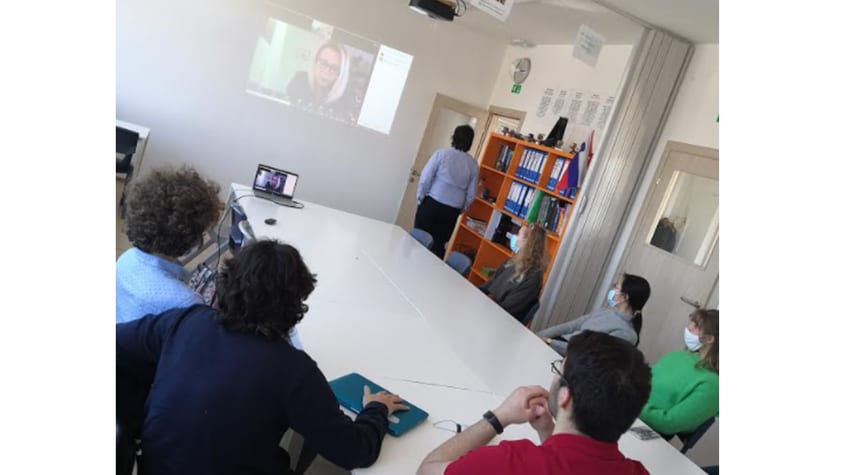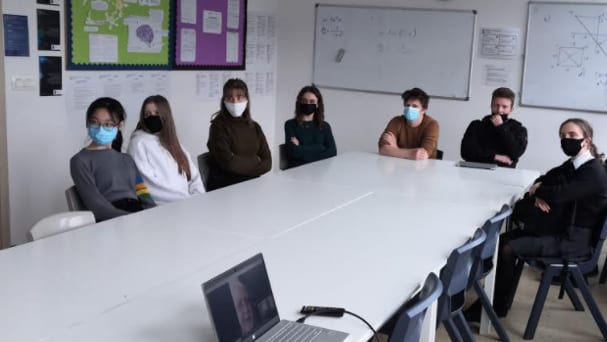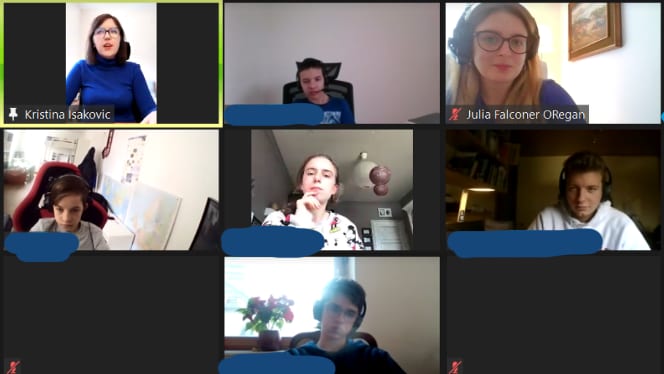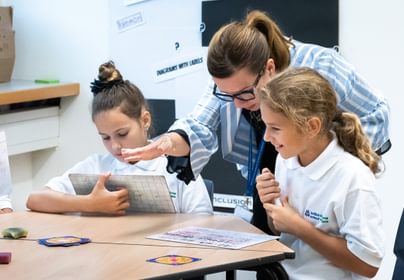Over the last six weeks at BISL we have organised seven career talks from a range of speakers from physicists to businessmen, for our Key Stage 4 and Sixth Form students, allowing them to explore a variety of career options.
These talks were open to all Key Stage 4 and Sixth Form students to attend voluntarily for 15 minutes during Form time. It is important for students to explore career options, understand routes to follow in order to get to certain careers and discover careers they may not even have considered or knew existed previously. All speakers spoke about their day-to-day lives at work, including the challenges, but also the path that led them to their current jobs.

On the business side of the talks, we welcomed businesswoman Kasia Szczesny from Krakow, who is a PMO at HSBC Bank, and has worked in many global offices within the company. She studied English and Economics at university and did not expect to have a corporate career. She spoke about her job and duties, as well as other important aspects of corporate business such as continuing your training, approaching companies when you are a student for work experience, and the benefits of travelling with work.
Ms Szczesny talked about the many opportunities to acquire skills through a company's global network, including travelling to different offices around the world for giving and receiving training, which you then bring back to your local offices to further your team’s projects. She highly recommended students find a job which suits them and makes them happy, as that, at the end of the day, is most important. Finally, she advised students not to be afraid to try various corporations, and to keep applying even if they are not successful on the first occasion, as sometimes the second or third time is the charm.

Students then spoke to Ray Worsnop, an entrepreneur from Yorkshire in England, who retired at age 47 after founding, building and selling multiple businesses in his lifetime, from scratch. Even though Mr Worsnop is a self-made millionaire, he believes the most important thing in a job is internal happiness, rather than financial – a message he was very keen to relay to our students.
Mr Worsnop spoke to our students about creating a business they are passionate about, and not going into business just to make millions (of course, that is always a bonus!). His key to success was finding something he could do and was interested in, and success followed. He was keen to give advice to students about the importance of asking for help when you can’t do something and focusing on what people can do rather than what they can’t do (including yourself). Speaking from experience he said his key to success was going into a business as equals with someone who is as passionate as you, not just someone who wants to capitalise. Students asked questions about Mr Worsnop’s inspirations, and how he found people to help him.
Considering a career in translating or music? Why not both? Our next speaker, John Culley, joined students on Zoom to tell them all about being a freelancer in both translating and music. Mr Culley translates German, Russian and English and has lived and travelled all around Europe working in his youth. He spoke about the difficulties of being a freelancer, which people may not have considered, such as medical care when working abroad with temporary contracts and various other things one needs to consider when working freelance.

Passionate about psychology, but not sure what you can do with a degree in psychology? Our students were able to meet three guest speakers, keen to showcase the range of careers you can pursue by being a psychology graduate.
Our first speaker was trauma psychologist (and PhD student) Helen Collins from Liverpool, who works in state healthcare. She spoke about her degree and the different paths psychology can take you down. She also spoke about the difficulties of working in state healthcare, with the moral obligation to help people but often with a lack of funding. Then, our students met Kerry Blore, who uses her psychology degree in her job every day, as she rehomes offenders in Scotland. This was a career not many of our students knew existed, so it made for an interesting conversation. Students then spoke with Police Officer Matt from Liverpool, who spoke about some of the common misconceptions of what the police do compared to what they actually do, and the importance of people skills in this role. Officer Matt explained how his psychology studies were invaluable when dealing with a range of vulnerable and violent offenders. Some interesting questions were asked, about the importance of people skills, and how to know when to intervene or step away from a situation.

Looking at a career in physics? Students welcomed, Kristina Isakovac, particle physicist and PhD student at the University of Ljubljana. She is currently researching the ‘Application of particle induced x-ray emission technic on an external beam line setup'. She explained how her job relates to other fields such as archaeology – when archaeologists find old coins for example, they send them to the lab she works in for analysis. Fascinating! Ms Isakovac was keen for students to enjoy physics and sciences in general and reassured our Key Stage 4 students if a career in physics specifically wasn’t for them, there are other areas of science they can give a chance.
We hope our students found this series of career talks insightful and that they have opened doors to careers they may not have considered before. In the future we plan to have more career talks with an even wider variety of speakers.



